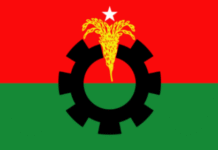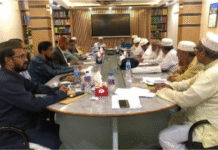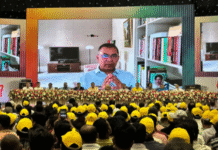In the hands of the international community
David Bergman May 4, 2022

Within the next 20 months, Bangladesh will hold national elections and the only relevant question is to what extent will the governing Awami League allow them to be free and fair — a proper reflection of the will of the people of the country — or will it instead rig the elections as it did four years ago. In 2018, the opposition were only allowed to win 7 out of 300 seats.
It may seem too early to be thinking about the election, but as the US ambassador to Bangladesh said in his recent speech, “the elections have already started”.
In its current 13 year period in government, the Awami League has faced three elections. At the end of 2008, after a two-year period of an army-controlled emergency caretaker government, the Awami League was voted into office in elections which are generally considered free and fair.
In 2011, however, the governing party removed the constitutional provision requiring the establishment of an independent election-time caretaker government and in response opposition parties, led by the Bangladesh Nationalist Party (BNP), boycotted the subsequent 2014 national elections, fearing that the Awami League would rig the polls. The boycotted elections resulted in over half of the 300 MPs elected unopposed and the other half elected after winning more votes than a non-opposition candidate.
The US embassy’s statement given soon after the elections reflected the sentiment of most other Western democratic countries when it stated: “[T]he results of the just-concluded elections do not appear to credibly express the will of the Bangladeshi people” and that “the government of Bangladesh and opposition parties” should “engage in immediate dialogue to find a way to hold as soon as possible elections that are free, fair, peaceful, and credible…”
After these elections, no large popular discontent surfaced, and the international community quickly stopped pressing for new elections, and none took place.
While the decision to boycott was understandable, it was also criticised by commentators who argued that it was foolhardy for the BNP not to have participated since it was riding high in the polls, and arguably, had they participated, the government may not have found it so easy to rig.
In that context, four years later, the opposition BNP was under significant pressure to take part in the 2018 elections, and they did. The participation of opposition parties provided a test for the Awami League government who had repeatedly asserted that elections were safe in their hands. However, it turned out that the BNP’s fears in 2014 were correct, as the elections were thoroughly rigged.
As we approach the 2023 elections, the BNP’s position —with memories of the 2018 election debacle still strong — is not to participate in the elections “under the current government”.
How these elections in the end play out will depend not so much on internal political factors — though they do play a part — but on the international community and the Awami League’s perception of it.
If there was no new pressure coming from outside Bangladesh — it would be fair to conclude that the Awami League would simply repeat the 2018 rigged election scenario, though perhaps less crudely. A combination of fear of the repressive Bangladesh state, along with an apparent unwillingness of people to come out in the streets in protest, would then allow the Awami League to carry on in power.
However, the situation does seem to have changed.
The US Global Magnitsky Act 2016, allowing sanctions for individuals involved in human rights, corruption and democratic violations, was enacted after the 2014 elections and used only for the first time through an executive order shortly before the 2018 elections. And the UK, Australia, and the European Union also enacted similar provisions after the 2018 election. Now however these jurisdictions have used these powers quite widely not only in relation to human rights abuses, but also in relation to rigged elections — in Belarus in 2020 and Nicaragua in 2021.
These new post-2018 powers in the hands of the democratic West may well have been perceived by the Bangladesh government, their ally, as having no bearing on it, but in December 2021 this changed when the United States government imposed sanctions on the country’s elite police unit the Rapid Action Battalion (RAB) and its current and former officials, including the country’s head of police.
These sanctions came as a total shock to the Bangladesh government and acted as a real jolt. Senior Bangladesh government officials have now had a chance to speak to their US counterparts in different forums and realised that the sanctions will not be removed quickly — indeed this was repeated by the ambassador in his recent speech — and that in addition to stopping extrajudicial killings, the US government expects there must be change in how the Awami League government approach democracy and human rights in general.
Following the December 2021 US sanctions, the Bangladesh government has escaped any additional sanctions from other countries and it is understood that the UK government has told at least some Bangladesh officials that it will not be sanctioning any Bangladesh officials. However, at the same time, some diplomats have told BNP politicians that they are using the Bangladesh government’s fear of sanctions to exert pressure on the government to democratise and hold free and fair elections.
So while there is no direct threat of future sanctions, the Bangladesh government is uncertain whether they will escape serious international censure if they fail to undertake some reforms and proceed to rig the elections.
The Bangladesh government is of course not a monolith. There are many factions within it holding different viewpoints, and in the end all key decisions are decided by the prime minister, Sheikh Hasina. But recent conversations indicate that at least some senior members of the government understand there can be no repeat of the 2018 election rigging and they will need to make changes.
The reforms have already started with attempts by the government to stop all enforced disappearances and extrajudicial killings — something which of course, ironically, they deny happen! Since the sanctions, the number of cases has come down considerably, and one should expect that this will continue to be the case.
Moreover, a senior government official has told this commentator that, as part of the pre-election reforms and in response to US concerns, Mir Ahmed, the son of the executed Mir Quasem Ali and Brigadier Abdullahil Amaan Azmi, the son of Ghulam Azam, both fathers convicted by the country’s International Crimes Tribunal, will be released from their secret detentions before the election. If so, this is quite sensational.
Both men were picked up within weeks of each other in August 2016 and have remained missing since then — for nearly six years. The Bangladesh government has always denied publicly any involvement in the abductions although there was extensive eye-witness evidence that law enforcement agencies had detained them. In the same three weeks that these two men were picked up, Hummam Quader Chowdhury, the son of Salauddin Quader Chowdhury, another man executed following a war crimes conviction, was also detained by law enforcement authorities. However, Hummam — unlike the other two men — was released eight months later onto the streets of Dhaka, though he has never spoken publicly about what happened to him in his period of secret detention.
Very few people imagined that the government still kept these two men alive in its secret detention cells — but this seems to be the case. “They are not dead,” the official said.
While it is always difficult for the state to release secretly detained people, the Bangladesh government is probably right to think that in light of the US sanctions they have more to gain from doing so than not. It just has to work out how to release them, inventing a “persuasive” narrative to suggest that these men were never in their custody. However, as to the fortunes of other disappeared men, this official had no information.
The senior government official has also claimed that we should soon see a weakening of current restrictions in relation to freedom of expression, with significant reforms finally being made to the Digital Security Act.
In relation to the election, the government understands that it cannot repeat the 2018 fiasco. The official claimed that what happened in 2018 was never the government’s objective but it was difficult to control individual Awami League MPs and the constituency activists who all wanted to make sure that they won, and with the highest percentages of support.
However, elections can only happen if the Awami League makes sufficient concessions that would be seen as unreasonable for the BNP to reject. This appears to be the government’s objective in the future. It is not clear what these concessions may be, but assuming that they are sufficient to tempt the BNP back into elections this does not mean that they will be free and fair. Even the government official seemed to acknowledge that the Awami League would make sure that it would win, only that the pre-election situation would be improved and the rigging would be far less obvious, confined only to a much smaller number of key constituencies.
Whether this will be enough for the democratic West, we will see. In all likelihood they would probably prefer the Awami League to win — due its positive social and economic record, continuing stability, uncertainty about what a BNP government would be like, and its continuing links to the fundamentalist Jamaat-e-Islami — so the democratic West may excuse relatively minor Awami League rigging.
The manner in which the democratic West reacts will also depend on how people in Bangladesh respond to rigged elections. If there are no popular protests then its response may be limited, but if peaceful protests do take place — as happened in Belarus — and they are subject to a violent response from the authorities, the international community could well react.
The conflict in Ukraine makes the distinction between authoritarian and democratic governments all the more significant to the West — and the Bangladesh government, now firmly within the authoritarian category, would be wise to recognise that.●
David Bergman (@TheDavidBergman) — a journalist based in Britain — is Editor, English of Netra News. He also runs the bangladeshpolitico blog









